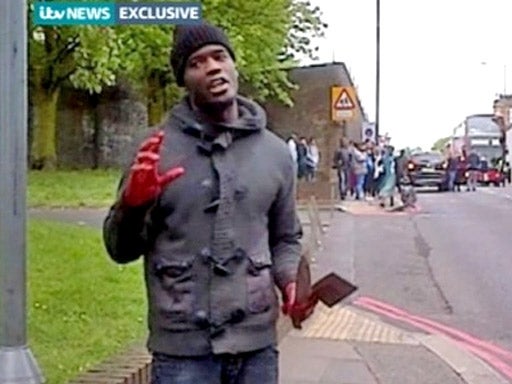Why are so many young men inured to violence?
After he fell out with his parents, Ziamani was radicalised in only 12 weeks

The murder of a British soldier, Fusilier Lee Rigby, on a street in Woolwich, east London, a couple of years ago shocked almost everyone who saw the aftermath in grisly TV footage.
The sight of one of the killers with his hands drenched in blood was chilling, so the realisation that a few people did not feel the same horror is deeply counter-intuitive.
How could anyone find such an event exciting or inspiring? One of the tiny minority who did was a Muslim convert called Brusthom Ziamani, a 19-year-old who idolised one of the killers and has now been convicted of planning a copycat attack.
Levels of violent crime have gone down in the UK in recent years, with the telling exceptions of sexual and domestic offences. It’s striking, however, that young men such as Ziamani or the Charlie Hebdo murderers are attracted by acts that most of us find utterly revolting. I can’t recall a time when we’ve been assailed so constantly by real-life images of torture and murder, yet videos of beheadings have not stopped a stream of young Britons heading for Syria to join Islamic State. Police say Syria-related terror arrests increased six-fold last year, while a man with a British accent is the chief suspect in the murder of several hostages.
The taboo against violence is not as powerful as we would like to imagine. It’s not just jihadist propaganda that lies behind this, effective though that clearly is. It’s also about varying degrees of psychological resilience, which make individuals react very differently when they find themselves in adverse circumstances. A number of European countries are emerging from recessions which have, among other things, impeded traditional male methods of building self-esteem. It’s been clear for some time that Islamist preachers target young men who come from unstable families, don’t have regular jobs and are on the fringes of petty crime. This doesn’t excuse them at all but it helps to explain how easily some individuals are drawn into destructive behaviour. After he fell out with his parents, Ziamani was radicalised in only 12 weeks.
Quite a bit of academic research has been devoted to the question of psychological resilience, and the factors which drive it down. Recession, unemployment and a lack of job security all have disastrous effects, creating what one study characterised as “fear, anger and a recurring sense of uselessness”. Official figures released last week show that the suicide rate is highest in North-east England, one of the most economically deprived areas of the country, and lowest in London.
I’m surprised that this highly visible effect of inequality isn’t discussed more often, given what we know from other statistics: the poorest fifth of adults are at significantly higher risk of developing a mental illness, while a 2011 survey suggested that people from minority ethnic backgrounds are six times more likely to be admitted to hospital because of mental health problems.
There is evidence that men and women handle feelings of hopelessness and low self-esteem differently. Last week’s figures showed that male suicide has reached its highest rate in more than a decade, a period which coincides with one of the worst recessions in recent history. Almost 5,000 men killed themselves in 2013 – more than three times higher than the number of female suicides.
I don’t know whether the prohibition against violence is weaker among men or they’re socialised to believe it solves problems. Male violence is and always has been big at the box-office: one of last year’s most successful films was American Sniper. A friend who watched the video of the Jordanian pilot burning to death observed that it was so professionally made that it didn’t feel real, and I wonder if impressionable youths from south London can tell the difference.
‘We love to die the way you live,’ Ziamani boasted in a letter found in his flat. It’s a common jihadist taunt, revealing how violent death has been deliberately romanticised to attract young men with nothing much to celebrate in their lives. Once they get to Syria, they desperately want to fit in, becoming brutalised to a point where they allow themselves to be photographed holding up severed human heads.
Islamic State is essentially a death cult – going to Syria to fight is not a long-term career option, to put it mildly – but it has recruited followers in London, Paris, Copenhagen and other European cities. One of the reasons I oppose publishing stills from its videos is that I don’t want to be brutalised by them, lulled into thinking that this kind of violence is unavoidable in the modern world. The damage it is doing is incalculable, and the need to address the problem of individuals with low psychological resilience has never been more pressing.
Twitter: @polblonde
politicalblonde.com
Join our commenting forum
Join thought-provoking conversations, follow other Independent readers and see their replies
Comments
Bookmark popover
Removed from bookmarks